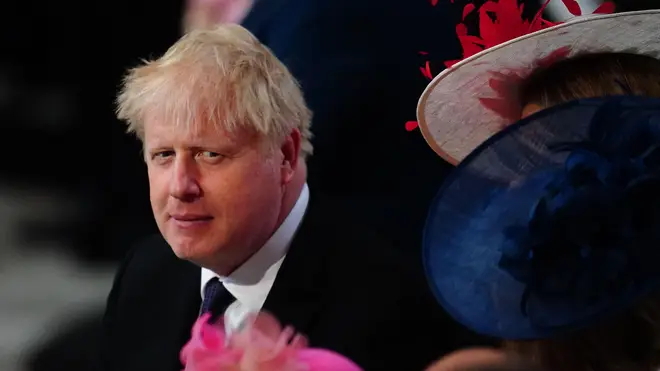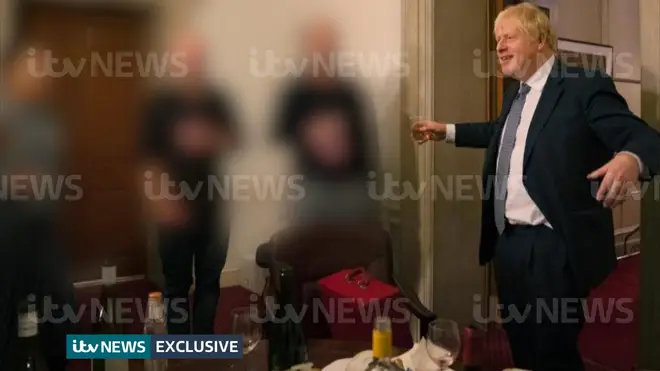
Nick Ferrari 7am - 10am
6 June 2022, 12:50 | Updated: 6 June 2022, 13:30

Conservative MPs are seeking to oust Boris Johnson as Prime Minister.
Facing a crunch vote tonight, Boris Johnson fights for his survival within his own party, as the letters of no confidence pile up on the desk of Sir Graham Brady, the chairman of backbench 1922 Committee.
Sir Graham has confirmed that there are enough letters of no confidence from MPs to trigger a vote, although he has not revealed the total number.
The secret ballot deciding the PM’s fate will take place between 6pm and 8pm tonight.
Johnson remains defiant in the face of his revolting backbenchers, with he and his supporters making it clear he intends to retain his position.
In a statement by No. 10 Downing St, a spokesperson said the PM was determined to carry on.
“The PM welcomes the opportunity to make his case to MPs and will remind them that when they're united and focused on the issues that matter to voters there is no more formidable political force.”
Conservative MPs are able to trigger a vote of no confidence against the leader, as long as a threshold of 54 letters calling for the vote is met, which represents 15 percent of the parliamentary party.
However, in order to kick Johnson out, at least 50 percent of MPs must vote against him.
MPs are able to submit their letters to trigger the leadership to the influential backbencher 1922 Committee, chaired by Sir Graham, who says that the 54 threshold has been met, but has kept the real numbers close to his chest.
All letters are considered confidential, unless the MP decides they want to make it available to the public.
Former supporter of Boris Johnson, Jesse Norman, who represents the Hereford and South Herefordshire publicly shared his letter, in which he condemns a ‘casual culture of law-breaking’, and described his claim that the Sue Gray report into breach of COVID-19 measures at No.10 Downing Street.
He also branded the ‘ugly’ Rwanda policy as counterproductive and legally dubious, and slammed the privatisation of Channel 4 as reasons for his vote of no confidence.
I have supported Boris Johnson for 15 years, for the London Mayoralty and for PM. Very sadly, I have written to him to say I can no longer do so, for the reasons set out below. pic.twitter.com/0Mjs4hjeSF
— Jesse Norman (@Jesse_Norman) June 6, 2022
Earlier this year, Boris Johnson made history by becoming the first PM in the UK to have broken the law.
Photos of event at No.10 revealed what appeared to be raucous, drunken parties taking place during lockdown in 2020, which were found to be in breach of Covid rules laid out by the government despite Johnson explaining them away as ‘work events’.
Johnson was slapped with a fine by the police, and faced criticism in an internal report for his illicit lockdown activities, which included late night parties, and even a booze-fuelled fight among staff.
Despite a brief reprieve during the escalation of the Russian-Ukraine war, the PM has been plagued by these revelations.
Public opinion have shown deep disapproval with the majority of those polled believing he knowingly lied over ‘Partygate’ and he should quit.
During the Queen’s Platinum Jubilee celebrations on Friday, crowds booed him as he entered St Paul’s Cathedral with wife Carrie Johnson.

These opinion polls have left MPs shaken, and many do not believe their party could win the next general election under Johnson’s leadership, with the Conservatives tipped to lose two upcoming by-elections in the South-West, and in the north of England.
From now until the vote, Johnson and his opponents will subject their undecided parliamentary cohort to vigorous lobbying in order to gain their support.
The vote will take place via secret ballot between 6pm and 8pm at Westminster, and photography will be banned, to stop the PM and his allies from demanding photographic evidence that an MP voted for him to remain in post.
The ballot will be a simple ‘yes’ or ‘no’, and MPs are expected to vote according to their conscience, with the option for those away from Westminster to nominate a proxy to vote on their behalf.
The results will be counted immediately, and Sir Graham has said arrangements for when the announcement will be released later on, also expressing his hopes for a ‘clear result’.
READ MORE: Boris battles for Downing St as Jeremy Hunt says he will vote against beleaguered PM

How can anyone defend PM given those who have resigned
If Johnson is ousted, a leadership competition will be triggered, of which he will not be able to put forward his candidacy.
Convention stipulates he will stay on as a caretaker until a new leader is elected.
There are two stages to a Conservative leadership election.
Any MP can put themselves forward as a leadership contender, but their parliamentary colleagues will narrow down the list to two choices in a serious of electoral ‘rounds’.
Once two MPs have been decided by the Parliamentary Conservative Party, the choice will be put to the membership, who will pick their preferred candidate.
Many argue that there is not an obvious replacement for Johnson.
Previously popular Chancellor of the Exchequer Rishi Sunak was also fined over ‘Partygate’, and is no longer considered a frontrunner.
Former cabinet member Jeremy Hunt is tipped to join the race, as is Defence Secretary Ben Wallace.
MP for Tonbridge and Malling Tom Tugendhat has openly declared he wants the top job.
Hunt was pipped to the post of leader of the Conservative party by Boris Johnson in 2019.
Even if Boris Johnson narrowly clings on to the leadership and retains the premiership, it could undermine his leadership, and he is not guaranteed to survive.
Although according to party rules Johnson is safe for another year until the 1922 Committee can hold another no-confidence vote, Sir Graham has hinted that rules could be changed.
He told reporters: “Technically it's possible for rules to be changed but the rule at present is there would be a period of grace.”
Whether Johnson manages to cling onto power remains to be seen, but it has been made clear that if the vote goes in his favour, it will not secure his position as PM.
His predecessor, Theresa May, had a confidence vote triggered against her in December 2018. Although she won the vote 200-117, she resigned only a few months later over Brexit-related unrest, making way for Johnson to take control.